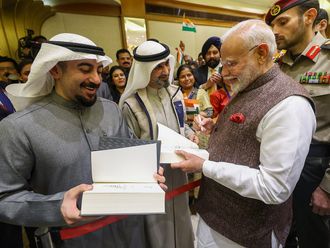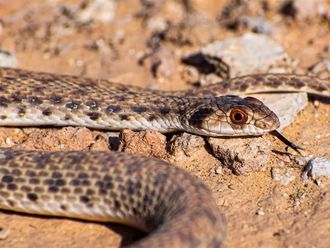Kolkata: In spite of all their differences, politicians from West Bengal have come together for the love of hilsa, a fish that has long been a staple for people from the state.
According to reports, India has begun the process of removing restrictions placed on hilsa trade under the India-Asean trade agreement. This effectively means that, by next year, the fish can be imported duty-free from Myanmar, with which India is trying to cement trade and economic relations.
West Bengal chief minister Mamata Banerjee and President Pranab Mukherjee making the issue a talking point amid politicians following an acute shortage of the fish. The price of hilsa shot up drastically towards the end of last year with prices ranging between 1,200-1,400 rupees (Dh77 to Dh90) a kilogram.
Banerjee wrote several letters to the federal commerce ministry this year to facilitate hilsa imports arguing that the fish was well beyond the reach of the middle-class. Commerce ministry officials say even President Mukherjee repeatedly enquired what was being done to facilitate hilsa imports.
Commerce minister Anand Sharma struck a deal to double the volume of hilsa imports from Myanmar while on a visit to that country.
Earlier, the commerce ministry had informed the West Bengal government that there were no restrictions on shipments from Myanmar. But with importers complaining of smuggling of the fish from Bangladesh, the federal government has decided against taking any chances and introduce a zero-duty regime.
While hilsa from the Padma River in Bangladesh is the most preferred fish on dining tables in West Bengal, the hilsa from the Irrawaddy delta is said to be equally tasty.
Officials say at least 2,500 to 3,000 tonnes of hilsa is likely to be imported from Myanmar, all duty-free. Bangladesh has put in place import restrictions as it finds it tough to cater to domestic demand.
“This will drastically bring down the price of hilsa in Kolkata and other cities of West Bengal and other neighbouring states with big Bengali population,” said West Bengal’s food minister Jyotipriya Mullick.
West Bengal’s catch of the coveted fish has fallen from 4,570 tonnes in 2011 to just 657 tonnes in 2012.
In between, scientists proposed creating sanctuaries to check indiscriminate fishing and promote breeding of the fish and to prevent its rapid decline in Indian waters. “We have identified three breeding sites in Diamond Harbour, Triveni and Farakka where sanctuaries could be built so that the fish can breed freely without human interference. We have asked the state government to build these sanctuaries,” said scientist Utpal Bhaumik. Hilsa are known to migrate from seawater to freshwater during the breeding season.










